Related Research Articles

Elizabeth I was Queen of England and Ireland from 17 November 1558 until her death in 1603. She was the last monarch of the House of Tudor.
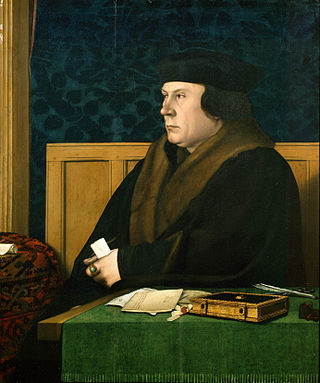
Thomas Cromwell, briefly Earl of Essex, was an English statesman and lawyer who served as chief minister to King Henry VIII from 1534 to 1540, when he was beheaded on orders of the king, who later blamed false charges for the execution.
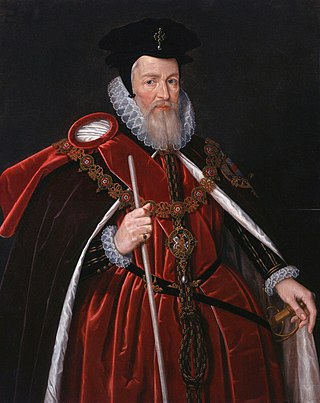
William Cecil, 1st Baron Burghley was an English statesman, the chief adviser of Queen Elizabeth I for most of her reign, twice Secretary of State and Lord High Treasurer from 1572. In his description in the Encyclopædia Britannica Eleventh Edition, A.F. Pollard wrote, "From 1558 for forty years the biography of Cecil is almost indistinguishable from that of Elizabeth and from the history of England."

Robert Cecil, 1st Earl of Salisbury, was an English statesman noted for his direction of the government during the Union of the Crowns, as Tudor England gave way to Stuart rule (1603). Lord Salisbury served as the Secretary of State of England (1596–1612) and Lord High Treasurer (1608–1612), succeeding his father as Queen Elizabeth I's Lord Privy Seal and remaining in power during the first nine years of King James I's reign until his own death.

In England and Wales, the Tudor period occurred between 1485 and 1603, including the Elizabethan era during the reign of Elizabeth I (1558–1603). The Tudor period coincides with the dynasty of the House of Tudor in England, which began with the reign of Henry VII. Under the Tudor dynasty, art, architecture, trade, exploration, and commerce flourished. Historian John Guy (1988) argued that "England was economically healthier, more expensive, and more optimistic under the Tudors" than at any time since the Roman occupation.

John Day was an English Protestant printer. He specialised in printing and distributing Protestant literature and pamphlets, and produced many small-format religious books, such as ABCs, sermons, and translations of psalms. He found fame, however, as the publisher of John Foxe's Actes and Monuments, also known as the Book of Martyrs, the largest and most technologically accomplished book printed in sixteenth-century England.
John Alexander Guy is a British historian and biographer specialising in the early modern period.
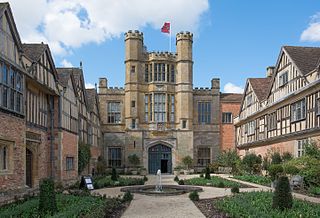
Sir Francis Throckmorton was a conspirator against Queen Elizabeth I of England in the Throckmorton Plot.

Diarmaid Ninian John MacCulloch is an English academic and historian, specialising in ecclesiastical history and the history of Christianity. Since 1995, he has been a fellow of St Cross College, Oxford; he was formerly the senior tutor. Since 1997, he has been Professor of the History of the Church at the University of Oxford.

Richard William Barber is a British historian who has published several books about medieval history and literature. His book The Knight and Chivalry, about the interplay between history and literature, won the Somerset Maugham Award, a well-known British literary prize, in 1971. A similarly-themed 2004 book, The Holy Grail: Imagination and Belief, was widely praised in the UK press, and received major reviews in The New York Times and The New Republic.
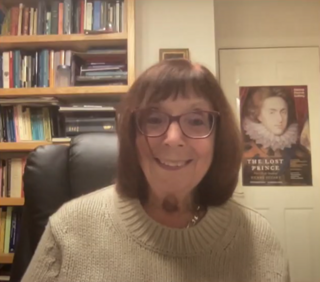
Susan Michelle Doran FRHistS is a British historian whose primary studies surround the reign of Elizabeth I, in particular the theme of marriage and succession. She has published and edited sixteen books, notably Elizabeth I and Religion, 1558-1603, Monarchy and Matrimony and Queen Elizabeth I, the last part of the British Library's Historic Lives series.
The 1583 Throckmorton Plot was one of a series of attempts by English Roman Catholics to depose Elizabeth I of England and replace her with Mary, Queen of Scots, then held under house arrest in England. The alleged objective was to facilitate a Spanish invasion of England, assassinate Elizabeth, and put Mary on the English throne.
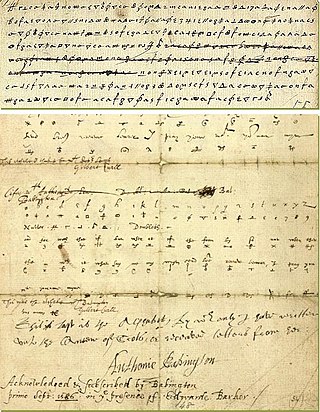
Charles Paget was a Roman Catholic conspirator, involved in the Babington Plot to assassinate Queen Elizabeth I of England.
Thomas Phelippes (1556–1625), also known as Thomas Phillips was a linguist, who was employed as a forger and intelligence gatherer. He served mainly under Sir Francis Walsingham, in the time of Elizabeth I, and most notably deciphered the coded letters of Babington Plot conspirators.
David Michael Loades was a British historian specialising in the Tudor era. He was Emeritus Professor of History at the University of Wales, where he taught from 1980 until 1996, and was Honorary Research Professor at the University of Sheffield from 1996 until 2008. In the 1960s and 1970s he taught at the universities of St. Andrews and Durham. From 1993 until 2004 he acted as Literary Director of the John Foxe Project at the British Academy; he subsequently became an Honorary Member of the History Faculty at the University of Oxford. After military service in the Royal Air Force 1953–1955, Loades studied at the University of Cambridge. He wrote many books on the Tudor period, including biographies. He was President of the Ecclesiastical History Society (1992–93).
Charles Baillie, or Bailly (1542–1625), was a Fleming by birth, but a Scot by descent. He was a papal agent and member of the household of Mary, Queen of Scots, following the murder of her husband. Having the mastery of several European languages he was, after Mary's imprisonment in England, employed in carrying out foreign plots on her behalf. Baillie was captured and imprisoned in the Tower of London and carved two inscriptions on the walls.

Thomas Yale was the Chancellor and Vicar general of the Head of the Church of England : Matthew Parker, 1st Lord Archbishop of Canterbury, and Edmund Grindal, Bishop of London. He was also Ambassador to his cousin, Queen Elizabeth Tudor, and Dean of the Arches at the Court of High Commission, during the Elizabethan Religious Settlement.

Daniel Gwynne Jones is a British popular historian, TV presenter, and journalist. He was educated at The Royal Latin School, a state grammar school in Buckingham, before attending Pembroke College, Cambridge.
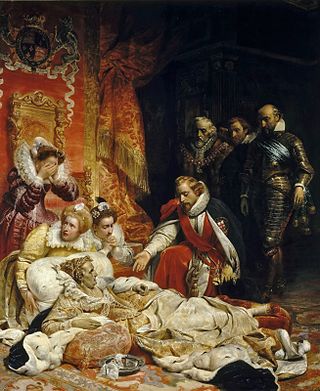
The succession to the childless queen of England Elizabeth I was an open question from her accession in 1558 to her death in 1603, when the crown passed to James VI of Scotland. While the accession of James went smoothly, the succession had been the subject of much debate for decades. In some scholarly views, it was a major political factor of the entire reign, even if not so voiced. Separate aspects have acquired their own nomenclature: the "Norfolk conspiracy", Patrick Collinson's "Elizabethan exclusion crisis", the "Secret Correspondence", and the "Valentine Thomas affair".
The Hermit's Welcome at Theobalds was an entertainment for Elizabeth I performed in May 1591, based around a hermit.
References
- ↑ "Profile - Faculty of Arts - University of Leeds - Stephen Alford". Leeds.ac.uk. Retrieved 9 May 2017.
- ↑ "Faculty of Arts, Humanities and Cultures" . Retrieved 15 April 2018.
- ↑ Keith Thomas (17 August 2012). "The Watchers: A Secret History of the Reign of Elizabeth I by Stephen Alford – review | Books". The Guardian. Retrieved 9 May 2017.
- ↑ Martin, Tim (13 September 2012). "The Watchers: A Secret History of the Reign of Elizabeth I by Stephen Alford: review". Telegraph. Retrieved 9 May 2017.
- ↑ Books (5 October 2012). "The Watchers: A Secret History of the Reign of Elizabeth I | Book Review". History Extra. Retrieved 9 May 2017.
- ↑ Gajda, Alexandra (13 November 2012). Reviews Stephen Alford. The Watchers: A Secret History of the Reign of Elizabeth I. New York: Bloomsbury Press, 2012. xvii + 398 pp. $35. Vol. 67. The University of Chicago Press Journals. p. 264. doi:10.1086/676207. ISBN 978-1-60819-009-6. S2CID 163585640.
- ↑ Jessie Childs (20 April 2017). "London's Triumph by Stephen Alford review – merchant adventurers and Tudor boomtime | Books". The Guardian. Retrieved 9 May 2017.
- ↑ Wooding, Lucy (27 April 2017). "Review: London's Triumph, by Stephen Alford | THE Books". Timeshighereducation.com. Retrieved 9 May 2017.